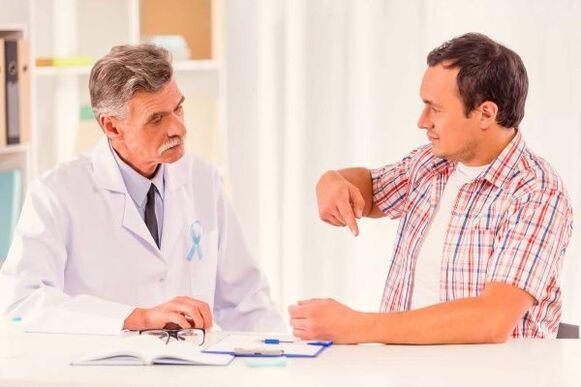Bacterial prostatitis is understood as an inflammatory process in the tissues of the prostate gland, which can proceed in an acute or chronic form. The disease is manifested by intense pain in the groin area, fever, signs of intoxication and therefore requires special attention from the medical staff.

We will tell you what are the causes of prostatitis, how it manifests itself and how it is treated.
Why does bacterial prostatitis occur?
According to research institutes, bacterial prostatitis affects sexually active men between the ages of 25 and 50. The reason is the introduction of pathogenic microflora into the genitourinary system through the mouth of the urethra.
Most often, the following types of pathogens are found in the prostate gland:
- staphylococcus;
- Pseudomonas aeruginosa or Escherichia coli;
- enterococcus.
These bodies are considered opportunists. They constantly inhabit a person's skin and mucous membranes and cause inflammation only under certain factors. According to the observations of urologists, the causes of the disease with a high degree of probability can be:
- Non-compliance with the rules of personal hygiene.
- A man's passion for anal sex (in 80% of cases, acute bacterial prostatitis is caused by E. coli, which lives in the rectum of a potential sexual partner).
- Incorrect or too frequent catheterization.
- Infiltration of an infection from the bladder, urethra or testicles.
- Some diseases (including AIDS and diabetes mellitus).
- Violations of the outflow of urine.
- Sexually transmitted infections.
Under the influence of the vital activity of microorganisms, the consistency of the secretion of the prostate is disrupted. In the organ, stagnant processes begin, which become the causes of unpleasant symptoms. In addition, this situation provokes an extensive inflammatory process, an increase in the size of the prostate and other ailments.

The main symptoms of the disease
Bacterial prostatitis often has an acute course, because the symptoms begin unexpectedly for men, develop rapidly and have various manifestations. Depending on the type of pathogen, the age of the pathological process and the state of the immune system, a man can complain of the following problems:
- An increase in body temperature up to 39 degrees, fever and chills.
- Sharp pain in the groin or lower abdomen. It can give to the scrotum, hip joints, anus.
- Frequent urination, especially at night. Almost always, a man pays attention to a burning sensation in the glans. As the disease progresses or the adenoma develops, he may begin acute urinary retention.
- Painful sensations in the anal area, often constipation.
- Flu-like symptoms - muscle and joint pain, general weakness.
If bacterial prostatitis is caused by an STI, there may be a different colored discharge from the penis, most often with an unpleasant odor. In this case, perhaps we are talking about urethroprostatitis.
The intensity of the symptoms largely depends on the stage of the inflammatory process. So, with a parenchymal form, the temperature can rise to 40 degrees and the pain becomes paroxysmal, while pain relievers may not help.
Methods for diagnosing the disease
The doctor makes a preliminary diagnosis on the basis of a man's complaints and anamnesis data: information about the lifestyle, existing chronic diseases, the date and circumstances of the first symptoms. To clarify the type of pathogen, the patient is sent to the urine delivery for bacteriological analysis. If the disease is chronic, it is possible to collect prostate secretion for research.
The following types of laboratory diagnostics can also be used:
- PCR research;
- general and biochemical blood test;
- blood test for PSA.
In the acute form, rectal palpation of the prostate gland is not performed. If there is no fever and the man is not bothered by severe pain, the doctor can touch the prostate with a finger through the rectum wall, determine its approximate size, shape, consistency.

The diagnosis is confirmed or denied by the TRUS results. This is an ultrasound in which a transducer is inserted into the patient's rectum. As a result, they get a clear picture of the changes in the tissues of the organ, the localization of the inflammatory process. To rule out cancer, they may send an MRI or CT scan, in particularly doubtful cases, for a biopsy of the prostate gland.
How to treat bacterial prostatitis
It is impossible to cure bacterial prostatitis without antibiotics. Folk remedies will give only a short-term effect, the pathogen will remain in the body and can cause various complications. Also, there is no best antibiotic, a man should remember. The choice of the drug depends on the type of pathogen, as well as on the work of the patient's organs and systems.
Antibiotics can be taken for up to two months under standard treatment regimens. However, the exact dosage, duration of the course and frequency of administration are selected individually, taking into account various indicators of the state of health.
In addition to antibiotic therapy, doctors provide reinforcing treatments. For this purpose, vitamin and mineral complexes are prescribed, non-steroidal anti-inflammatory drugs are selected, in some cases immunomodulators are prescribed. Antipyretic and pain relieving drugs are also prescribed. If you have trouble urinating with bacterial prostatitis, doctors may place a catheter.
Throughout the course, you need to observe bed rest, take care of yourself from stress and anxiety.
The use of suppositories for bacterial prostatitis
To combat prostatitis locally, various rectal suppositories can be prescribed. They cannot cure bacterial prostatitis, but they will significantly alleviate the patient's condition.
Most often, urologists prescribe:
- suppositories with papaverine - relieves pain and improves blood microcirculation;
- candles with propolis - improve the functioning of the immune system, eliminate edema, help reduce pain;
There is no information on the effectiveness of magnetic candles with barium ferrite. In traditional medicine, this method of treatment is practically not used.
Prostate massage and any warm-up activities are prohibited in acute bacterial prostatitis.
If the treatment tactics were chosen correctly and the man did not engage in self-healing, the prognosis is favorable. Otherwise, the transition of the disease to a chronic form or the development of certain diseases is possible.

What complications can be
Complications of bacterial prostatitis can occur if a man has not consulted a doctor for a long time or if he has been provided with unskilled assistance. The consequences are different, up to sepsis and death.
Most often, against the background of an untreated disease, the following diseases occur:
- pyelonephritis;
- cystitis;
- abscess of the prostate gland.
In some cases, erectile dysfunction or infertility may develop. To prevent unwanted consequences, a man with bacterial prostatitis should be treated in an inpatient unit.
Sex with bacterial prostatitis
The possibility of having sex with this form of inflammation of the prostate gland depends on which pathogen is caused by the pathology and at what stage it is. If the causative agent is an STI, intimate communication is prohibited.
In the acute phase, a man has no time for amorous pleasures. Unbearable pain, urinary disturbances, fever are often accompanied by poor erection, because the libido disappears. In the case of the chronic form, intimate life is possible, but with the use of barrier contraceptives and after consulting a doctor.
For a woman, bacterial prostatitis can be dangerous - there is a risk of infecting her with sexually transmitted diseases. A sick person must remember this.
Conclusion
Bacterial prostatitis can be cured if it has a chronic form, and the man consulted a doctor in time and does not rely on dubious methods, pills and prescriptions. The chronic form is more difficult to respond to therapeutic effects, therefore a clinical examination will be necessary to check the state of health.































